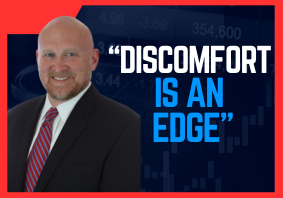Since we have launched the new Epsilon Theory site, the engagement from our readers has been, withou
Why Hope?
To learn more about Epsilon Theory and be notified when we release new content sign up here. You’ll receive an email every week and your information will never be shared with anyone else.
Continue the discussion at the Epsilon Theory Forum
The Latest From Epsilon Theory
DISCLOSURES
This commentary is being provided to you as general information only and should not be taken as investment advice. The opinions expressed in these materials represent the personal views of the author(s). It is not investment research or a research recommendation, as it does not constitute substantive research or analysis. Any action that you take as a result of information contained in this document is ultimately your responsibility. Epsilon Theory will not accept liability for any loss or damage, including without limitation to any loss of profit, which may arise directly or indirectly from use of or reliance on such information. Consult your investment advisor before making any investment decisions. It must be noted, that no one can accurately predict the future of the market with certainty or guarantee future investment performance. Past performance is not a guarantee of future results. Statements in this communication are forward-looking statements. The forward-looking statements and other views expressed herein are as of the date of this publication. Actual future results or occurrences may differ significantly from those anticipated in any forward-looking statements, and there is no guarantee that any predictions will come to pass. The views expressed herein are subject to change at any time, due to numerous market and other factors. Epsilon Theory disclaims any obligation to update publicly or revise any forward-looking statements or views expressed herein. This information is neither an offer to sell nor a solicitation of any offer to buy any securities. This commentary has been prepared without regard to the individual financial circumstances and objectives of persons who receive it. Epsilon Theory recommends that investors independently evaluate particular investments and strategies, and encourages investors to seek the advice of a financial advisor. The appropriateness of a particular investment or strategy will depend on an investor’s individual circumstances and objectives.
This commentary is being provided to you as general information only and should not be taken as investment advice. The opinions expressed in these materials represent the personal views of the author(s). It is not investment research or a research recommendation, as it does not constitute substantive research or analysis. Any action that you take as a result of information contained in this document is ultimately your responsibility. Epsilon Theory will not accept liability for any loss or damage, including without limitation to any loss of profit, which may arise directly or indirectly from use of or reliance on such information. Consult your investment advisor before making any investment decisions. It must be noted, that no one can accurately predict the future of the market with certainty or guarantee future investment performance. Past performance is not a guarantee of future results. Statements in this communication are forward-looking statements. The forward-looking statements and other views expressed herein are as of the date of this publication. Actual future results or occurrences may differ significantly from those anticipated in any forward-looking statements, and there is no guarantee that any predictions will come to pass. The views expressed herein are subject to change at any time, due to numerous market and other factors. Epsilon Theory disclaims any obligation to update publicly or revise any forward-looking statements or views expressed herein. This information is neither an offer to sell nor a solicitation of any offer to buy any securities. This commentary has been prepared without regard to the individual financial circumstances and objectives of persons who receive it. Epsilon Theory recommends that investors independently evaluate particular investments and strategies, and encourages investors to seek the advice of a financial advisor. The appropriateness of a particular investment or strategy will depend on an investor’s individual circumstances and objectives.











The two worlds are so very intertwined; I don’t believe the world of reality could exist without the world of abstraction. Is it really “bad news” that our brains want to convince us that we live in the world of abstraction? I believe the constant panging fear of the abstraction world is what drives people so hard to create and maintain the world of reality.
That’s the really screwed up thing about humans. Complacency is the worst possible condition for us, it leads to stagnation which will rot away the mind. You can’t have highs if there are no lows.
When I read ET, I see that you, Ben H, and now David S, are doing a fantastic job showing us how external narratives are constructed, replete with missionaries and common knowledge. The expose on the ‘Wall Street favorite’ is a masterful example. (I suspect that ‘pre-existing condition’ could be rendered as well.)
(But) our human brains will construct a narrative even from randomness. (And so we have the Las Vegas victims being so-called Trump supporters.) Some minds need simple ways of organizing the randomness around them, and it is at this moment where the unhinged may merge an external narrative and their internal need for simplification, too often with disastrous consequences.
More rational minds put a governor on this tendancy, but in a widening gyre and competition, those governors appear to be failing.
So Faith, Hope, Love - I get it now!
Thanks for another perfectly timed article. In his book Sapiens, Harari believes that cooperation based on what we call narratives ( he calls myths) is what makes humans so successful as a species. So it could be that the world of abstraction really is as important as the real world. Having two almost non-overlapping narratives is clearly what is breaking us. The Second Foundation writing bringing clear eyes and open hearts to this time and place is truly bringing hope to my days. Thanks for creating this pack!
Yes! Completely intertwined, and often completely indispensable. It’s part of how we experience the world, whether we like it or not.
But there’s symbolism and deep meaning on the one hand, and then there are attempts to use this to coerce. Rejecting the latter without losing the former? It’s a trick.
This is really well stated, Victor. I hadn’t thought of it that way.
You’re right, myths ARE important, and that is exactly what we’re talking about. Harari’s myths are what I wrote about as Holy Theatre, and what Ben wrote about in Letter from a Birmingham Museum.
Glad to be part of the pack with you, too!
Just to echo the comments above, thanks for continuing to put big ideas up top. It helps.
I’m no anthropologist, but even I can see that Homo Sapiens owes its success to teamwork (it sure ain’t our speed or strength). Over the millennia a profound receptivity to (and facility with) narrative abstraction has been selected for in our DNA precisely because well-organized teams beat unorganized teams, technological advances result from abstractive thinking more often than chance, and having a shared narrative Mission is a prime indicator/motivator of a strong team.
I don’t think we can switch this off. It’s indivisible from our humanity. We abhor a narrative vacuum, so it matters greatly what our narratives are. People acting under the influence of narrative can do amazing, beautiful feats: rescue strangers from flood and fire, jump on a live grenade, etc. Equally, if you feed them slightly different narratives, they can become torturers (e.g. Milgram experiment).
My worst anxiety, presently, is that tinctures of fear and loathing will corrupt our best narratives more easily than we realize. It may only take a nudge! Then terrible beliefs will become commonly held, and we will slip a long, long way backward.
Ahh! Oh, and Happy Halloween!
“I don’t think we can switch this off.” - Roger that, John. Brings to mind the time Joe Rogan sat down with physicist Lawrence Krauss. At one point during their talk, Krauss asserted with total sincerity that people should just take comfort and embrace the meaningless of the universe. I didn’t mind his insights about astrophysics but this obsequious personal outlook was a galactic heap of rubbish. Essentially the guy was arguing that people should abandon any and all narrative abstractions and instead be richly fulfilled with… nothingness.
Well…, while the rest of us have been trying to stay afloat on a sea of endless story arcs, Krauss is lately getting the ax from his post at Arizona State for sexual misconduct. He should’ve stuck with trying to fuck his nothingness instead of other people. Evidently the guy doesn’t watch much TV either as Rick & Morty explores meaningless in a much more compelling way.
Safe to say we can be assured that opting out of narrative altogether in favor of exquisitely constructed intellectual agnosticism is not something to take seriously. But activating hatred and fear certainly is. So serious that the US War Department (later renamed Department of Defense) at one point took great pains to deconstruct such narratives:
Don’t Be a Sucker (1945)
https://www.youtube.com/watch?v=vGAqYNFQdZ4
Thomas, I’m going to speculate that very few followers here are in the loop about Krauss. I could easily be way off. The author of ‘A Universe from Nothing’, he is also a theo-skeptic. He is part of main stream cosmology and astrophysics and uses ‘science’ as an anti-theist (agnostic) tool.
I disagree with your specific reference to Krauss in this forum even though to me your ‘exquisitely constructed intellectual agnosticism’ has more idea-density than any four words other than ‘much ado about nothing’!
Ever since theoretical astrophysicists started relying on big mathematics to legitimize their ever-expanding bubble of cosmology books, they are looking more and more like modern economists - heaven help them! We don’t need to pile on. Cheers
Points taken. I do likes to fool about with words. Although I kept typing meaningless instead of meaninglessness.
I hadn’t thought about how Krauss’s crowd are akin to modern economists but it sounds like they vacation on the same cruise line. I do however think Krauss is relevant as an extreme example of opposition against the importance of narratives. It’s rather confounding for me when highly intelligent individuals are simultaneously oblivious to mundane truths about the role which narrative performs in human societies. My densely worded description of Kraussism hopefully reads as rather absurd because I think his suggestion about embracing meaninglessness is largely the same. To be clear, I don’t actually disregard the grand argument he makes about how insignificant humankind is against the immensity of the universe or the non-negotiable limits of nature. But it’s still such an ill-suited and useless suggestion to put forward in this moment of history. It sounded to my ears like Krauss just wanted to bypass our narrative hurdles because that’s what he does. Yet as John states, “we abhor a narrative vacuum” and very few would find Kraussism to be of any help in their lives. Neither would it help to combat the powerful narratives of “fear and loathing” that John also writes of. Maybe we can give it another look after each of us is given few spare decades to ponder the cosmos.
In the end, the guy was rather ungracious in communicating his ideas during the Rogan interview. Lousy advice that didn’t persuade. By contrast, Neil deGrasse Tyson knows how to work an audience and speak persuasively.